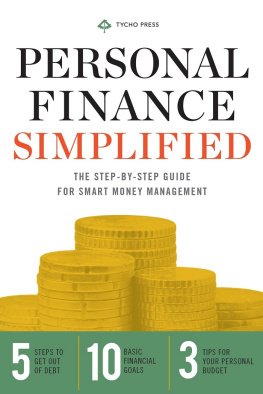Securing Your Financial Future
Securing Your Financial Future
Complete Personal Finance for Beginners
Chris Smith
ROWMAN & LITTLEFIELD PUBLISHERS, INC.
Lanham Boulder New York Toronto Plymouth, UK
This publication is designed to provide accurate and authoritative information in regard to the subject matter covered. It is sold with the understanding that neither the author nor the publisher is engaged in rendering legal, accounting, securities trading, or other professional service. If legal, real estate, or securities investment assistance is required, the services of a competent professional person should be sought. The author and publisher specifically disclaim any liability that is incurred from the use or application of the contents of this book.
Published by Rowman & Littlefield Publishers, Inc.
A wholly owned subsidiary of The Rowman & Littlefield Publishing Group, Inc.
4501 Forbes Boulevard, Suite 200, Lanham, Maryland 20706
http://www.rowmanlittlefield.com
10 Thornbury Road, Plymouth PL6 7PP, United Kingdom
Copyright 2012 by Rowman & Littlefield Publishers, Inc.
All rights reserved. No part of this book may be reproduced in any form or by any electronic or mechanical means, including information storage and retrieval systems, without written permission from the publisher, except by a reviewer who may quote passages in a review.
British Library Cataloguing in Publication Information Available
Library of Congress Cataloging-in-Publication Data
Smith, Chris, 1955
Securing your financial future : complete personal finance for beginners / Chris Smith.
p. cm.
Includes bibliographical references and index.
ISBN 978-1-4422-1422-4 (pbk. : alk. paper) ISBN 978-1-4422-1423-1 (ebook)
1. Finance, Personal. I. Title.
HG179.S5495 2012
332.024dc23
2011047879
 The paper used in this publication meets the minimum requirements of American National Standard for Information SciencesPermanence of Paper for Printed Library Materials, ANSI/NISO Z39.48-1992.
The paper used in this publication meets the minimum requirements of American National Standard for Information SciencesPermanence of Paper for Printed Library Materials, ANSI/NISO Z39.48-1992.
Printed in the United States of America
Preface
T his book is about how to manage your personal finances responsibly and successfully. Unlike most books on this subject, it is specifically intended for those who are just starting out in their financial life, or who will be soon. It covers the essential principles that are important for just about everyone to know. Even though the concepts are fundamental ones, most people have never had a chance to learn them in any kind of organized waywhich is exactly what were going to do.
Heres your first lesson: before you listen to anyone explain anything about personal finance, you should first understand what their agenda is. Thats just what this preface is forbut in order to explain my objective in writing the book, Ill need to tell you the story that led up to it.
Im a dad, and I have two college-age sons. Like most parents, I wanted to make sure that my sons got at least some exposure to the subject of how to manage their money. Since they werent likely to get this kind of training in school, and since I have a financial background, I knew that I was the likely candidate to teach them. Besides, I knew just how I wanted to approach it. My own dad had been a finance professional too, and thats how I had first learned about the subjectfriendly fatherly lectures spontaneously delivered as teachable moments arose. If that sounds a little boring, it really wasnt; my dad had a great way of making it fun as well as educational. And since that approach had worked well enough with me, why not make it a family tradition?
But had it really worked for me? After some reflection, I had to admit that the answer wasnt quite as clear-cut as Id been imagining. Even though Ive ended up in a position of financial independence, I took a very roundabout way of getting therebecause I didnt really take the whole topic very seriously at first. I made a lot of mistakes, especially when I was just starting out. I eventually began doing a lot of the things that Id been taught, but sometimes only after a little experimenting on my ownwith predictably bad results. Other times I did the right things, but in the wrong order, or without the appropriate safeguards.
Id enjoyed my dads early lessons and understood them at the time, but more as an opportunity to match wits with him than to really try to master the topic. My thinking was that I had my whole financial life in front of me, and there was plenty of time to get serious about money management later. In the end, thats just about how it turned outan informal explanation of the basics, then plenty of mistakes and experimentation, followed by renewed determination and recovery from the mistakes, and finally a relatively happy ending. Good enough for me, so it would be enough for my sons, right?
Wrong.
Heres why: the financial world has changed, and in some very significant ways. I didnt realize it at first, because the changes had occurred incrementally, bit by bit. But once I began doing some research to refresh my memory on the basics, I came to realize that over the course of an entire generation, the cumulative effect has been dramatic. The problem isnt that what my dad taught me has gotten out of dateon the contrary, these timeless principles have become more important than ever. But what has changed is the financial environment. And it has changed in such a way that requires you to have a much more complete understanding of personal finance right from the start of your financial life. Spending a decade or more to finally get serious about a long-term financial planlike I didis a luxury that todays young people can no longer afford.
The financial world that I grew up in was quite forgiving, although I didnt appreciate it at the time. In those days, the whole key was finding and maintaining a good steady income. Once youd done that, turning that income into long-term financial security didnt require too much heavy-duty planning or decision making. Of course, there were some choices to make, but they didnt tend to be of the make-or-break variety. I was lucky to have gotten some sound, early training in money management, but in those financially friendly times, it wasnt really essentialit was more like icing on the cake.
Back then, the employment landscape was more stable. It wasnt unusual to work for the same employer for many years at a stretch, even decades. And once you had a job (and/or joined a union), lots of things were taken care of on your behalf. Medical insurance was heavily subsidized (which prevented many of us from noticing just how fast health-care costs were steadily increasing). More important, years of service were typically rewarded with a wonderful retirement benefit called a pension : the employer continued to pay the employee a fixed monthly amount, after retirement, for life. This meant that behind the scenes, employers and unions were making most of the important long-term investment decisions on behalf of their employees; the employees just had to concentrate on their jobs. On top of that, Social Security could be counted on to supplement pension income with monthly payments after age 65. If you also owned a house, then you had a chance for even more security; the increases in housing prices were so dependable that a big equity was almost a guarantee. Of course, all those advantages could be reversed by getting into significant debt, but that wasnt too common, because credit was pretty tough to getespecially for young people.
But the foundations of that simple world have been crumbling for some time. If there was any remaining doubt that the old days are gone forever, it was dramatically erased by the recent subprime lending crisis and widespread financial meltdown. Todays employment landscape is far more fragmented, and long stretches with a single employer are the exception instead of the rule. Self-employment and short-term contract work are now much more common. Medical insurance is often still subsidized, but the subsidies are shrinking while the costs continue to balloon. The days of employer pensions are just about completely gone, replaced by investment plans like 401(k)s; employees must now make their own decisions about how much to save, which investments to choose, how to adjust them over time, and how to manage the intricacies of the available retirement tax shelters. At the same time, the range and complexity of available investment products has increased tremendously. There is serious and growing doubt about the long-term viability of Social Security as weve historically known it. Young people today often begin their financial lives in debt, in the form of student loans. On top of that, credit cards are aggressively advertised and readily available, despite recent reforms. Confidence in home-equity growth as a staple of retirement planning has been deeply shakenand for good reason.

















 The paper used in this publication meets the minimum requirements of American National Standard for Information SciencesPermanence of Paper for Printed Library Materials, ANSI/NISO Z39.48-1992.
The paper used in this publication meets the minimum requirements of American National Standard for Information SciencesPermanence of Paper for Printed Library Materials, ANSI/NISO Z39.48-1992.